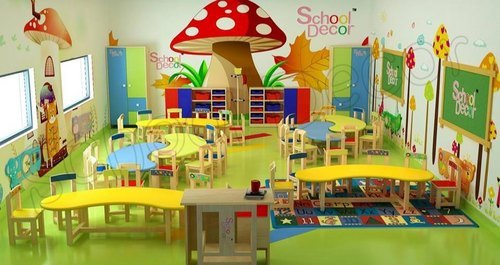Introduction of Pre-School
Pre Schools are set up with a goal of early childhood development, which offers a structured curriculum with a focus on academic readiness preparing the children of the age group 3-5. Not just nurturing early minds, the pre school leans towards the early academic phase of a child.
Introduction of Play School
Play School offers the children an environment where they play, and develop through socializing. It is meant for the children of the age group 2-5 for their structural development. It has a less formal set up and motivates creative and social learning processes.
Importance and benefits of Pre School and Play School
Early Learning
Pre Schools and Play Schools are established in order to introduce the children to some basic academic concepts and lay the foundation for their intellectual growth.
Socialization
This aspect of social learning is also important to forge a sense of friendship, empathy, trust and a sense of community by developing interpersonal Skills.
Emotional Development
Emotional development makes sense in an environment where children learn to express and manage their emotions which is also contributed by their peers.
Independence and Confidence
Opportunities of decision making and problem solving at the foundational level makes it possible for boosting self-esteem and acquiring confidence at this very stage making them independent.
Cognitive ability
To foster a sense of cognitive ability the children are given to play with numbers, shapes and such purposeful activities that sharpens their critical thinking and memory.
Language Development
Activities like those of Story-telling, recitation and peer communication play a major role in the development of language among the children.
Preparing for Formal Education
By introducing concepts like routines and academic concepts, pre-schools make it easier for the students to adapt to certain notions of classroom setting.
Routine and Discipline
Providing routines in the early academic structure fosters a disciplinary insight to the children as students, which adapts them to further academic demands.
School Readiness
These academic settings are basically introduced to instill the very idea of listening, following instructions and collaborating, which makes them ready for the classroom.
Difference between Playschool and Pre School
- Preschool and Playschool are terms used to describe educational programs for children before they enter formal school. Although these terms are sometimes used interchangeably, there are some differences between them.
- Playschool is typically a less structured, more informal program for children 2 to 5 years old.The emphasis is on learning through play and developing social skills rather than academic preparation. Playschool children participate in activities such as singing, dancing, telling stories, and playing with toys.
- Preschool, on the other hand, is a more structured program that focuses on preparing children for kindergarten and beyond. In preschool, children often learn basic academic skills such as counting, letter recognition, and early reading and writing. Preschool also places emphasis on developing social and emotional skills, as well as fine and gross motor skills.
Variables should be considered while choosing a preschool or Playschool
Philosophy and Approach
Make sure the Institution’s Philosophy aligns with your values and goals for your child’s early education. Whether it’s a fun approach, Montessori or something else, the right philosophy leads to a positive learning experience.
Age Group
Check the age group which is served by the preschool. Make sure it is appropriate for your child’s developmental stage. An age-appropriate environment enhances socialization and creates an atmosphere which serves the development of young minds.
Location
Always interact with the location of the preschool in terms of convenience and safety even in the neighborhood. Proximal distance can make drop-off and pick-up more manageable.
Duration
Parents must make sure that preschool hours fit your schedule and that the length of the program meets your child’s developmental needs without any stress.
Reputation and reviews
Do some background research of the preschool and check testimonials from other parents in the community.
Class size and student-teacher ratio
Smaller classes and lower student-teacher ratios often contribute to a more personalized learning experience. Ensure that the preschool maintains the right proportions.
Safety and cleanliness
This must be a priority, things like security measures, safe entry points and clean sanitary environment with well-maintained facilities.
Facilities and resources
Assess all facilities provided. Look for appropriate toys, learning materials, outdoor play areas, and well-equipped classrooms as a must.
Parent Involvement
A preschool that encourages parent involvement will foster a collaborative learning environment, allowing you to participate in your child’s educational journey.
Costs and financial aid
Investing in your child’s education is one of the biggest investments you are ever going to make. Make sure the fees align with your budget as a household and are not a burden. Also look out for scholarships and waivers as an aid.
Teaching Methods and Techniques used in Preschool or Playschool
Use of symbols and logos
Symbols and logos are visual aids to enhance understanding. These images can make learning engaging and accessible for young children, helping with memory and cognitive development.
Naming and matching activities
Activities that involve associating words with corresponding objects or images, promote vocabulary development in language and strengthen cognitive connections.
Gardening
Gardening helps children learn and also adds to the empathetic aspect towards nature. Not only does it add to their knowledge but also helps them value the flora preparing them to do good in science as well as for the plants.
Learning through games
Small games make a child develop in every way be it physical or physiological. Games are small apparatuses which take the liberty to make players learn certain rules and enjoy the play being disciplined at the same time.
Child-centered approach
Child-centered approach puts children’s interests, needs and choices first in the learning process and promotes curiosity.
Arts and Creativity
Through drawing, coloring and crafts, children develop fine motor skills, creativity and the ability to communicate their ideas visually which stimulates imagination and self-expression.
Music and Movement
Music and movement activities improve coordination and rhythm, also contributing to emotional expression and social integration.
Outdoor Games
Preschools incorporate outdoor activities to encourage exercise, sensory exploration, and health fostering a holistic approach to learning.
Sensory Activities
Sensory activities engage multiple senses, activities like finger painting, sand play, or texture exploration, children refine sensory perceptions.
Parent Involvement
Preschools often encourage parent involvement through activities like parent-teacher meetings, or participation in school events; this collaboration strengthens the home-school connection.
Positive Reinforcement
Positive reinforcement techniques, such as praise and encouragement, are used to reinforce desired behaviors and achievements promoting a positive learning environment.
Group Activities
Group activities promote teamwork, social skills and cooperation through collaborative projects, circle time or group discussions, these activities foster a sense of community and belonging.
Fine motor skills
Activities that focus on fine motor skills, such as cutting, tracing and stringing, improve hand-eye coordination and dexterity, these skills are important for tasks such as writing and drawing.
Early Literacy and Numeracy
Schools introduce early literacy and numeracy concepts through activities. Storytelling, counting, and letter recognition activities lay the foundation for future academic success by cultivating a love of reading and basic math skills.
Download PPT on Preschool vs Playschool

View Video on Preschool vs Playschool
FAQs on Preschool vs Playschool
Is play school the same as preschool?
Ans: No, Preschool is not the same as Playschool because playschool is generally more focused on play-based learning and socialization, while preschool is more focused on preparing children for formal education.
Is a preschool or playschool really necessary?
Ans: Yes, these educational set ups are also relevant and necessary because they prepare students for a more structured and formal school set up.












